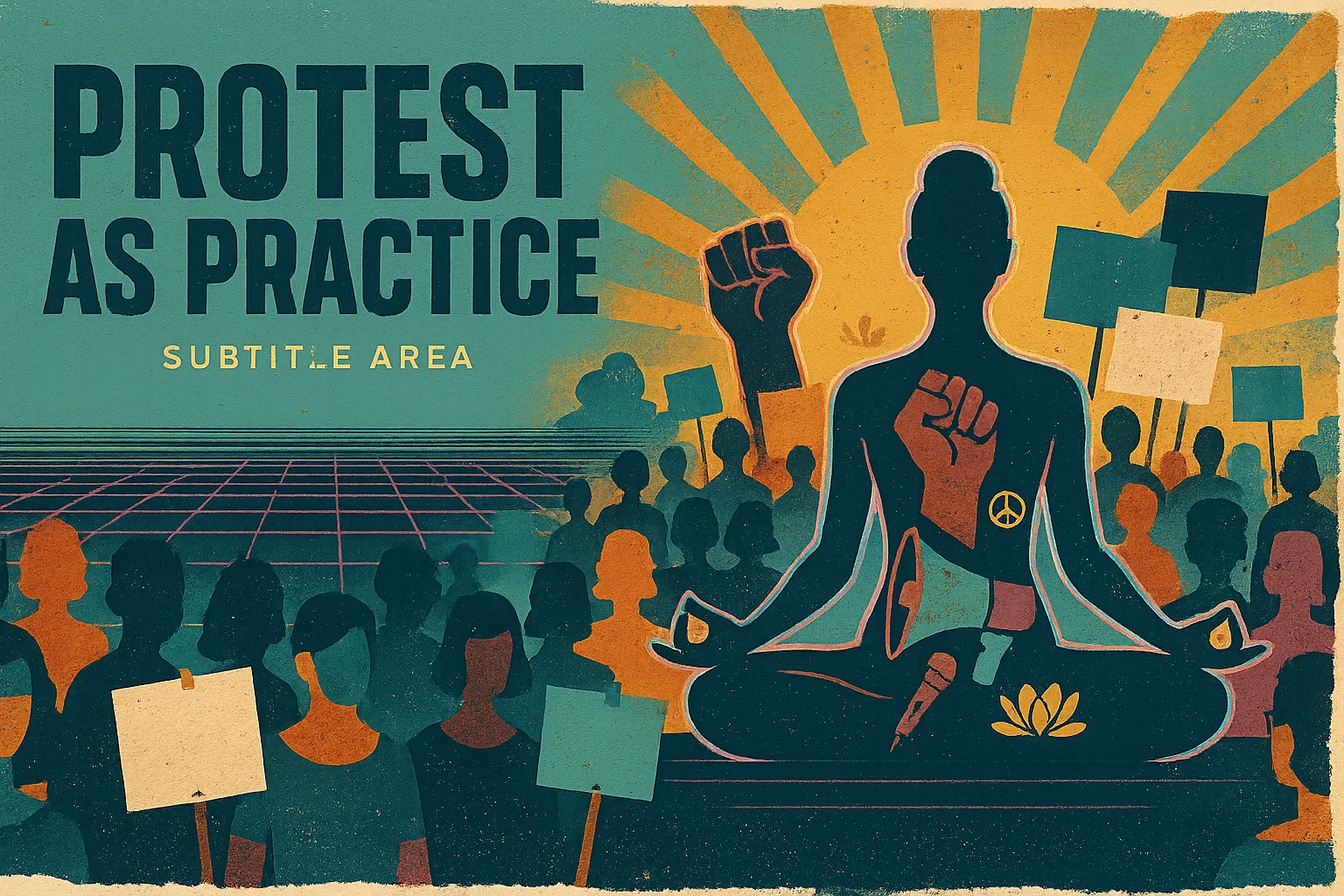Protest as Practice
Have you noticed how diverse our community is? I’m not gonna lie… it brings me so much joy. So many races, countires of origin, sexual identities, and ages– all practicing in one spot. Straight dudes, Fem Dykes, Catholics, Central American Mystics, and one MJH– fuck yo’ pokemon, we got ’em all. 😉
This weekend, we’re hosting sign-making at the studio ahead of the No Kings protest in DC. Members are invited for self-practice and to prepare signs if they’d like. Come for prax, stay for signs. Many in our community cannot protest due to fear of deportation. Phones are no longer safe to use at these events without being tracked. Be aware of your rights—this is important information.
This announcement might seem simple, but it represents something I’ve spent years learning to navigate: How do we maintain a practice space that’s both politically engaged AND welcoming to diverse perspectives? How do we stand for clear values while respecting that people arrive at different strategies for living those values?
I want to share the thinking behind announcements like this, because I suspect many of you—whether you run studios, lead communities, or just wonder how to hold space for political difference—are navigating similar questions.
The Central Tension
Practice spaces need to be two things that can seem contradictory:
Principled: Clear about values, not neutral about human dignity
Inclusive: Welcoming diverse political perspectives, not requiring ideological conformity
Many spaces collapse into a false binary: either completely apolitical (refusing to take any stance) or requiring political conformity (only one perspective allowed).
But there’s a middle ground: We can be clear about core values while remaining inclusive of diverse strategies for achieving those values. We can set boundaries against views that violate human dignity while welcoming legitimate disagreement about tactics, timeframes, and approaches.
This is the both/and we’re trying to hold.
What We Stand For (Non-Negotiable)
Our community values include:
Human dignity – All people have inherent worth
Non-harm – Ahiṃsā extended to all people
Bodily autonomy – Each person’s sovereignty over their own body
Freedom from violence and coercion
Right to exist safely – Regardless of identity, immigration status, religion, or political belief
These are principles, not partisan positions. They have political implications, but they’re not about party affiliation—they’re about human dignity.
We respect all views so long as those views don’t strip humanity from others. That’s the boundary.
What We Don’t Require Agreement On
Many political questions exist where thoughtful, principled people disagree:
Economic policy approaches (how to address inequality—many legitimate strategies)
Tactical questions about change (protest vs. electoral work vs. mutual aid vs. other approaches)
Timeframe debates (incremental vs. revolutionary change—both have merits)
Foreign policy positions (complex questions, multiple valid perspectives)
This is legitimate diversity. When we disagree about how to achieve shared values, that’s not only acceptable—it’s valuable. Different perspectives, different strategies, different forms of engagement all have their place.
The key distinction: Disagreement about how to achieve shared values (legitimate) vs. disagreement about whether all people deserve dignity (violates core values).
Why This Weekend’s Announcement Works the Way It Does
Let me break down the thinking behind it:
“Members are invited… if they would like”
This is invitation, not requirement. No pressure to participate. No judgment for non-participation. Maintains space for diverse comfort levels and beliefs. Resources are support. Requirements are coercive.
What This Looks Like Over Time
Building a culture that can handle political diversity isn’t just about individual announcements—it’s about consistent practice:
We state values clearly from the beginning. New students learn what this community stands for before political moments arise. This creates foundation.
We model principled, not partisan, thinking. When discussing anything with political implications, we frame it in terms of principles, not parties. We acknowledge complexity and multiple valid approaches.
We teach applicable practices. Nervous system regulation for those experiencing political anxiety. Anger work for those processing injustice. Grief practices for those processing loss. Resilience cultivation for those engaged in long-term work. These practices serve whatever you’re navigating—political stress, work stress, personal challenges. They’re tools, not prescriptions.
We normalize range of engagement. Some of you are deeply engaged in activism. Some are focused on other forms of service. Some need politics-free space to maintain sanity. All of these are valid. This studio supports whatever relationship to political engagement serves your wellbeing.
When We Mess Up (Because We Will)
I don’t always get this right. Sometimes I:
Assume political uniformity that doesn’t exist
Use language that alienates rather than includes
Don’t sufficiently acknowledge constraints on participation
Make some students feel excluded when trying to support others
When this happens, I try to:
Acknowledge the impact, not just the intention
Take responsibility without defensiveness
Clarify values and inclusion
Adjust approach going forward
Stay available for conversation
This is iterative work. We learn by doing, by listening, by repairing.
The Both/And We’re Holding
Our practice space is:
BOTH politically engaged (clear values, supporting activism when appropriate)
AND politically diverse (welcoming range of perspectives and engagement levels)
BOTH principled (boundaries against dehumanization)
AND inclusive (space for disagreement about strategies)
BOTH acknowledging political reality (affects us differently, can’t be ignored)
AND maintaining practice function (still primarily about practice)
BOTH supporting activism (resources, information, encouragement)
AND supporting non-participation (respecting diverse constraints and choices)
Final Thought
The world is complex, contradictory, and messy. Demanding perfect political purity in practice space isn’t useful—it’s another form of rigidity that yoga practice is supposed to help us move beyond.
What is possible: Clear values about human dignity + space for diverse strategies + recognition of different risks and constraints + support without coercion.
This weekend, if you want to make signs at the studio, we’re here. If you want to practice in refuge from political intensity, we’re here. If you’re navigating this moment in some other way entirely, we’re here.
The studio serves the practice. The practice serves you. How you engage with the political moment is yours to decide.
May we all find our way through this with clarity, compassion, and respect for the different paths we walk.



